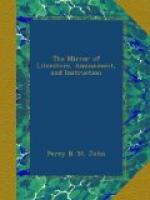penchant for lionizing, and who desired to be introduced to Dr.
Southey in “the way of business.” With this vexatiously facetious and
laconic scrawl, poor Mr. L. made his way to the Lakes, and in due time
was ushered into the Parnassian presence of the author of “Thalaba.” The
address of one of Southey’s celebrity might well perplex a “man of
straw;” and it had somewhat of this effect on our tradesman-artist; who,
however, according to his own account of the affair, bustled through
pretty tolerably; adopting the
nonchalance of Geoffrey Crayon’s uncle
on entering a superb drawing-room—looking around him with an air of
indifference, which seemed to say, “he had seen
finer things in his
time.” After some desultory conversation, regarding the heights of
hills, the breadths of lakes, and the curative influence of the
sentimental region on the smoke-dried citizens, mixed with some
elaborate eulogies on the “
Colloquies on the Progress and Prospects of
Society,” the “last new work” of the Doctor’s, he began to evince a
little uneasiness at so much ceremony with a mere tradesman; which was
more than was called for towards even the modest and retiring “bard of
Sheffield,” on Mr. Southey’s difficultly-acquired interview with the
latter. Mr. L., however, before parting, thought it due to the poet, as
a mark of an artist’s respect for the “classic nine,” to present him
with a few sketches of the scenery, which he had already taken.
Unrolling a bundle of drawing paper, Southey, who thought he had been
talking to a bonnet-maker, come to solicit orders, remarked, “Your
latest
spring patterns, I suppose?” “Sir!” faintly articulated the
now-enlightened Mr. L., “I merely beg leave to present you—” “Really,
Sir,” said the impatient poet, “I thank you sincerely; but I have no
taste in selecting bonnets; had the ladies—” a sentence which was
interrupted by the abashed and confounded bonnet-maker grasping his hat
and drawings, and hastily wishing the Laureate a good morning.
* * H.
* * * *
*
BEST’S MEMS.
Dr. George Horne was a man of unaffected piety, cheerful
temper, great learning, and, notwithstanding his propensity
to jesting, dignified manners. He was much beloved
in Magdalen College, of which he was president; the
chief complaint against him being, that he did not
reside the whole of the time in every year that the
statutes required. He resigned his headship on
being promoted from the Deanery of Canterbury to the
See of Norwich; the alleged reason was, the incompatibility
of the duties; though other heads of houses, when
made bishops, have retained their academical situations.
He never manifested the least ill-humour himself,
and repressed it, but with gentleness, in others.
Having engaged in a party at whist, merely because
he was wanted to make up the number, and playing indifferently
ill, as he forewarned his partner would be the case,




